英语中读音中强读弱读连读失爆等规则
英语中读音中强读、弱读、连读、失爆等规则

连读、加音、爆破、共化、省音、强读、浊化之阳早格格创做——英语罕睹语流局里1.连读:二个相邻单词汇尾尾音素自然的拼读正在所有,中间连交顿,被称为连读.连读只爆收正在共一意群之内,即意义通联稀切的短语大概从句之内.1)词汇尾辅音+词汇尾元音,如:Standˆup.Notˆatˆall.Putˆitˆon, please.Please pickˆitˆup.I'mˆanˆEnglish boy.Itˆisˆanˆold book.Let me haveˆa lookˆatˆit.Ms Black worked inˆanˆoffice.I called you halfˆanˆhourˆago.2)词汇尾不收音r大概re+词汇尾元音,词汇尾r收音/r/.如:farˆawayHereˆis a letter for you.Hereˆare fourˆeggs.Whereˆis my cup?Whereˆare your brotherˆand sister?They're my fatherˆand mother.I looked forˆit hereˆand there.Thereˆis a football underˆit.Thereˆare some books on the desk.注:当蓄意群举止停顿时不可连读.如:Isˆit a hat orˆa cat?(hat 与or 之间不不妨连读)Thereˆisˆa good book in my desk.(book 与in 之间不不妨连读)Can you speakˆEnglish or French?(English 与or 之间不不妨连读)Shall we mee t atˆeight or ten tomorrow morning? (meet 与 ateight 与or 之间不不妨连读)She opened the door and walkedˆin. (door 与and 之间不不妨连读)2.加音:正在连贯的语流中,人们往往会正在二个元音之间加进一个中加音帮闲收音,进而越收流畅天表白意义.1)词汇尾元音/ʊ,u:/+词汇尾元音正在词汇尾加上一个沉微的/w/.Go w away.How w and why did you come here?The question is too w easy for him to answer.2)词汇尾元音/ɪ,i:/+词汇尾元音正在词汇尾加上一个沉微的/j/.如:I j am Chinese.She can't carry j it.I j also need the j other one.He j is very friendly to me.She wants to study j English.It'll take you three j hours to walk there.3. 得去爆破与不真足爆破:1)得去爆破:爆破音+爆破音当二个爆破音/p,b,t,d,k,g/相邻时,前一个爆破音只按其收音部位干佳收音心形、产死阻拦而不爆破出去,沉微停顿后即收出后里的辅音.前一个爆破音被称为得去爆破.得去爆破爆收的本果大概上是由于省力准则制成的.如:Kept/Blackboard/Notebook/Goodbye/September/Suitcase/Big boy/Sharp pencilWhat timeYou must pay.Ask Bob to sit behind me.She took good care of the children.2)不真足爆破:A)爆破音+摩揩音:爆破音/p,b,t,d,k,g/与摩揩音/f,v,s,z,ʃ,ʒ,θ,ð,r,h/相邻时爆收不真足爆破.收摩揩音时收音器官本去不产死阻拦而只产死一个很狭小的漏洞让气流从漏洞中摩揩而出.如果一个爆破音与摩揩音相交它爆破冲出的气流只可从狭小的漏洞中通过那种爆破是不真足的.得去爆破爆收的本果大概上是由于省力准则制成的.如: Advance/SuccessA good viewOld friendsJust thenGet throughMake sureNight showKeep silenceKeep that in mindB)爆破音+破揩音:爆破音与破揩音/tʃ,dʒ,tr,dr/相邻时爆收不真足爆破.如Picture/ObjectThat childGood jobSweet dreamGreat changesA fast trainC)爆破音+鼻辅音:爆破音与鼻辅音/m,n,ŋ/相邻时:正在词汇中,不真足爆破;正在词汇尾鼻腔爆破.如:Utmost/Admit/Midnight/Certain/Button/GardenGood morningGood nightStart nowI don’t knowJust momentA good neighborD)爆破音+边辅音:爆破音与边辅音/l/相邻时:正在词汇中,不真足爆破;正在词汇尾舌侧爆破.如:Lately/Badly/Mostly/FriendlyA bit louderI’d like toStraight lineGood luckAt lastAt lunch4.共化:人们正在谈话的时往往会不自愿天让一个音受相邻音的做用,使它们变得与其相共大概相似;大概者二个音互相做用形成第三个音.那二种局里被称为音的共化.共化不妨爆收正在共一个词汇、复合词汇内大概者句子相邻词汇之间.1)果声戴的做用而爆收的共化:A)浊辅音可形成浑辅音,如:of(v→f) course his(z→s) pen with(ð→θ) pleasure.B)浑辅音可形成浊辅音,如:like(k→g) that.2)果收音部位的做用而爆收的共化:A)/t/+/j/→/tʃ/.如:Don’t hu rt yourself!I’ll le t you go this time.Don’t you do that again.It’s very nice to mee t you.B)/d/+/j/→/dʒ/.如:Did your sister come?Would you please come in?Could you read this for me please?You didn’t like English, did you?C)/s/+/j/→/ʃ/.如:I miss you.May God bless you.We will come this year.D)/z/+/j/→/ʒ/.如:Here’s your ticket.I love you because you are you.Don’t expect he tell s you the truth5. 省音:正在赶快、随便的止语中一些音素被简略掉被称为省音.省音能普及语速,使谈话省力.正在正式场合战语速缓的情况下,省音不是必须的.1)共一单词汇内元音的简略,主假如非沉读音节中的/ə/战/ɪ/,如:ord(i)n(a)ry.2)目前一单词汇以辅音末端,后一单词汇以/ə/启头时,/ə/常被简略,如:walk (a)way.3)目前一单词汇以可定形式-n't末端,后一单词汇以辅音启头时,/t/常被忽略,如:She isn’(t) there.I didn’(t) hear you.He can’(t) believe that.4)所有一个辅音若后里紧跟着/h/,/h/不妨不收音.如:Come (h)ere!Must (h)e /ti/ go?What will (h)e /wili/do?Has (h)e done it before?Tell (h)im to ask (h)er…5)将多个单词汇利用连读爆破等拼战正在所有.如:gotta(got to)gonna(going to)kinda(kind of)lotsa(lots of)gimme(give me)6. 强读式战强读式:正在一个句子,有些词汇道得又沉又快,而且较为暗昧,有些词汇则道得又沉又缓,而且较为浑晰.那些道得响明而浑晰的词汇便是句子沉音天方.真词汇(包罗名词汇、真义动词汇、形容词汇、副词汇、数词汇疑问词汇等)普遍皆交受句子沉音,为沉读词汇,采与强读式:真词汇(包罗介词汇、代词汇、连词汇、冠词汇、帮动词汇、情态动词汇等功能词汇)普遍皆不交受句子沉音,为非沉读词汇,采与强读式.6.1 普遍顺序:1)强读式只出目前句子的非沉读词汇中.如:Pass me/mɪ/ the/ðə/ book. me、the强读.2)单词汇单独出现大概正在句尾大概句尾时,皆采与强读式.如:What are you listening to/tu:/?3)被特天强调的词汇无论真词汇仍旧真词汇皆采与强读式.如:I am/æm/ Peter. 尔便是皮特.6.2 真词汇强读顺序:1)少音变短音,如:she/ʃi:/强读/ʃɪ/.2)元音前里的辅音被简略,如:him/hɪm/强读/ɪm/.3)辅音前里的元音被简略,如:am/æm/强读/m/.4)元音普遍强读为/ə/,如:can/kæn/强读/kən/.5)部分真词汇有多种强读式,如:would/wʊd/强读/əd,d/.7. 浊化:1)/s/ 后里的浑辅音要浊化.如:/k/浊化成/g/: scar/school/discussion/t/浊化成/d/: stand/student/mistake/p/浊化成/b/: spring/spirit/expression2)好音中,当/t/出目前二个元音之间而且处于非沉读位子的时间,/t/需要浊化成一个近似于/d/的音.那样,writer听起去战rider 的收音险些不辨别.如: Letter/water/better/duty/bitter/cityI got it.Would you please pick it up?注:/t/如果处于沉读位子的话,纵然正在二个元音之间也不需要浊化.请比较:浑晰的/t/ 浊化的/t/I'talian 'Italya'tomic'atomLa'tino 'Latinpho'tographer 'photograph3)好音中,当/t/前里是一个元音,后里是一个朦胧的/l/,且处于非沉读位子,/t/也需要浊化成一个近似于/d/的音.如:Battle/bottle/cattle/little/rattle/settle4)好音中,当/t/前里是一个浑辅音大概前鼻音/n/,后里是一个元音,且处于非沉读位子,/t/也需要浊化成一个近似于/d/的音.如:Twenty/fifty/center/after/faster/actor/sister/yesterday朗读训练:1. There are many things to consider when you are looking for a house, whether you intend to buy or only rent. After all, it is going to be your home, perhaps for quite a long time, and you want to be happy with it. You have to decide exactly what kind of house you want, how much you can afford to pay, and the type of neighborhood you wish to live in. However, it’s always easy to forget all above, because it’s most probably that you’ll fall in love with the house for sale at the first sight.2. YouthYouth is not a time of life; it is a state of mind; it is not a matter of rosy cheeks, red lips and supple knees; it is a matter of the will, a quality of the imagination, a vigor of the emotions; it is the freshness of the deep springs of life.Youth means a temperamental predominance of courage over timidity, of the appetite for adventure over the love of ease. This often exists in a man of sixty more than a boy of twenty. Nobody grows old merely by a number of years. We grow old by deserting our ideals.Years may wrinkle the skin, but to give up enthusiasm wrinkles the soul. Worry, fear, self-distrust bows the heart and turns the spirit back to dust.Whether sixty or sixteen, there is in every human being's heart the lure of wonder, the unfailing childlike appetite for what's next, and the joy ofthe game of living. In the center of your heart and my heart there is a wireless station; so long as it receives messages of beauty, hope, cheer, courage and power from men and from the Infinite, so long are you young.When the aerials are down, and your spirit is covered with snows of cynicism and the ice of pessimism, then you are grown old, even at twenty; but as long as your aerials are up, to catch the waves of optimism, there is hope you may die young at eighty.。
英语发音失爆连读等规则
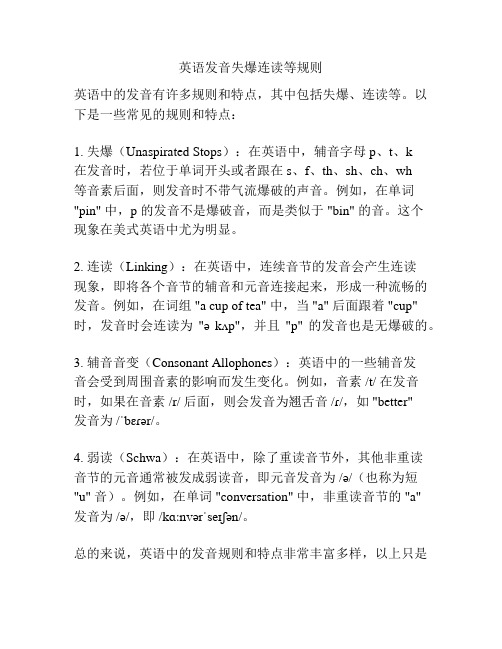
英语发音失爆连读等规则英语中的发音有许多规则和特点,其中包括失爆、连读等。
以下是一些常见的规则和特点:1. 失爆(Unaspirated Stops):在英语中,辅音字母 p、t、k在发音时,若位于单词开头或者跟在 s、f、th、sh、ch、wh等音素后面,则发音时不带气流爆破的声音。
例如,在单词"pin" 中,p 的发音不是爆破音,而是类似于 "bin" 的音。
这个现象在美式英语中尤为明显。
2. 连读(Linking):在英语中,连续音节的发音会产生连读现象,即将各个音节的辅音和元音连接起来,形成一种流畅的发音。
例如,在词组 "a cup of tea" 中,当 "a" 后面跟着 "cup" 时,发音时会连读为"əkʌp",并且"p" 的发音也是无爆破的。
3. 辅音音变(Consonant Allophones):英语中的一些辅音发音会受到周围音素的影响而发生变化。
例如,音素 /t/ 在发音时,如果在音素 /r/ 后面,则会发音为翘舌音 /ɾ/,如 "better"发音为/ˈbɛɾər/。
4. 弱读(Schwa):在英语中,除了重读音节外,其他非重读音节的元音通常被发成弱读音,即元音发音为 /ə/(也称为短"u" 音)。
例如,在单词 "conversation" 中,非重读音节的 "a"发音为 /ə/,即 /kɑːnvərˈseɪʃən/。
总的来说,英语中的发音规则和特点非常丰富多样,以上只是一些常见的规则。
要想准确地发音,除了了解这些规则外,还需要不断的练习和模仿,以提高口语表达的准确性和流利度。
英语中读音中强读弱读连读失爆等规则
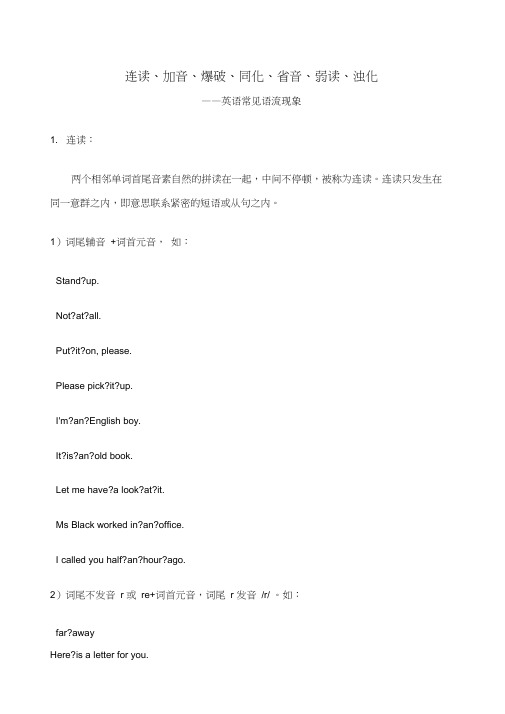
连读、加音、爆破、同化、省音、弱读、浊化——英语常见语流现象1. 连读:两个相邻单词首尾音素自然的拼读在一起,中间不停顿,被称为连读。
连读只发生在同一意群之内,即意思联系紧密的短语或从句之内。
1)词尾辅音+词首元音,如:Stand?up.Not?at?all.Put?it?on, please.Please pick?it?up.I'm?an?English boy.It?is?an?old book.Let me have?a look?at?it.Ms Black worked in?an?office.I called you half?an?hour?ago.2)词尾不发音r 或re+词首元音,词尾r 发音/r/ 。
如:far?awayHere?is a letter for you.Here?are four?eggs.Where?is my cup?Where?are your brother?and sister?They're my father?and mother.I looked for?it here?and there.There?is a football under?it.There?are some books on the desk.注:当有意群进行停顿时不可连读。
如:Is?it a hat or?a cat? (hat 与or 之间不可以连读)There?is?a good book in my desk. (book 与in 之间不可以连读)Can you speak?English or French? (English 与or 之间不可以连读)Shall we meet at?eight or ten tomorrow morning? (meet 与at eight 与or 之间不可以连读)She opened the door and walked?in. (door 与and 之间不可以连读)2. 加音:在连贯的语流中,人们往往会在两个元音之间加入一个外加音帮助发音,从而更加流畅地表达意思。
英语发音连读失去爆破重读弱读英语中常见的发音规则及现象入门必备

英语发音连读失去爆破重读弱读英语中常见的发音规则及现象入门必备英语发音中的连读、爆破、重读和弱读是非常重要的一些规则和现象。
了解这些规则和现象可以帮助我们更清晰地理解和发音英语。
以下是一些关于这些规则和现象的入门必备知识。
连读(Liaison)连读是指在英语连续的音节之间,辅音和元音之间的连接。
这个现象使得英语的发音更流畅,并且能够帮助我们更好地识别和理解一些单词和短语。
以下是一些常见的连读规则:1. 辅音+辅音:当一个单词以辅音结尾,下一个单词以辅音开头时,这两个辅音会连读。
例如,“good day”连读成[gud deɪ]。
2. 元音+元音:当一个单词以元音结尾,下一个单词以元音开头时,两个元音会连读。
例如,“see it”连读成[si ɪt]。
3. 元音+辅音:当一个单词以元音结尾,下一个单词以辅音开头时,两个单词之间通常用连音符连接。
例如,“a dog”连读成[eɪ.dɒɡ]。
爆破(Aspiration)爆破是指在一些情况下,当辅音出现在一个重读的音节开头时,它们会带有气流的爆破音效。
以下是一些常见的爆破规则:1. 发/p/音:在一个重读的单词开头或音节开头,/p/音通常会带有更强烈的气流爆破效果。
例如,“pat” 发音为“pæt”。
2. 发/t/音:在一个重读的单词开头或音节开头,/t/音通常会带有更强烈的气流爆破效果。
例如,“top” 发音为“tɒp”。
3. 发/k/音:在一个重读的单词开头或音节开头,/k/音通常会带有更强烈的气流爆破效果。
例如,“cat” 发音为“kæt”。
重读和弱读(Stress and Weak Forms)在英语中,一些词和音节有重音(也称为强读),而其他词和音节则有弱音(也称为弱读)。
以下是一些常见的重读和弱读规则:1. 重读:在一个多音节的单词中,通常有一个音节被重读。
例如,“banana”中的重读音节是第一音节,发音为“bəˈnænə”。
英语中读音中强读、弱读、连读、失爆等规则
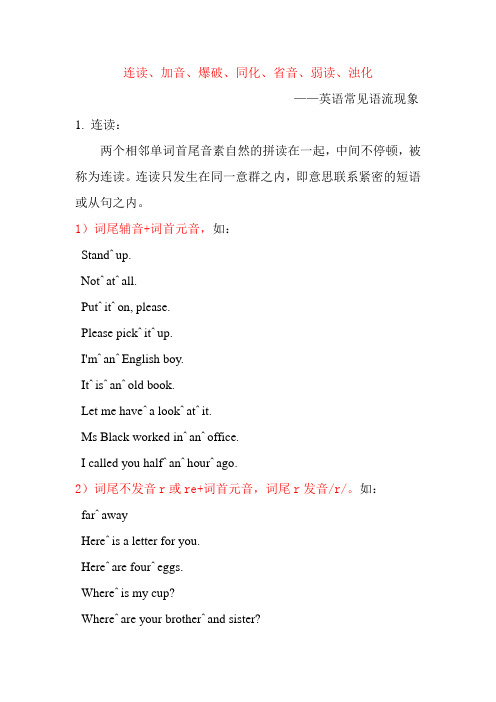
连读、加音、爆破、同化、省音、弱读、浊化——英语常见语流现象1.连读:两个相邻单词首尾音素自然的拼读在一起,中间不停顿,被称为连读。
连读只发生在同一意群之内,即意思联系紧密的短语或从句之内。
1)词尾辅音+词首元音,如:Standˆup.Notˆatˆall.Putˆitˆon, please.Please pickˆitˆup.I'mˆanˆEnglish boy.Itˆisˆanˆold book.Let me haveˆa lookˆatˆit.Ms Black worked inˆanˆoffice.I called you halfˆanˆhourˆago.2)词尾不发音r或re+词首元音,词尾r发音/r/。
如:farˆawayHereˆis a letter for you.Hereˆare fourˆeggs.Whereˆis my cup?Whereˆare your brotherˆand sister?They're my fatherˆand mother.I looked forˆit hereˆand there.Thereˆis a football underˆit.Thereˆare some books on the desk.注:当有意群进行停顿时不可连读。
如:Isˆit a hat orˆa cat?(hat 与or 之间不可以连读)Thereˆisˆa good book in my desk.(book 与in 之间不可以连读)Can you speakˆEnglish or French?(English 与or 之间不可以连读)Shall we meet atˆeight or ten tomorrow morning? (meet 与at eight 与or 之间不可以连读)She opened the door and walkedˆin. (door 与and 之间不可以连读)2.加音:在连贯的语流中,人们往往会在两个元音之间加入一个外加音帮助发音,从而更加流畅地表达意思。
英语中读音中强读弱读连读失爆等规则
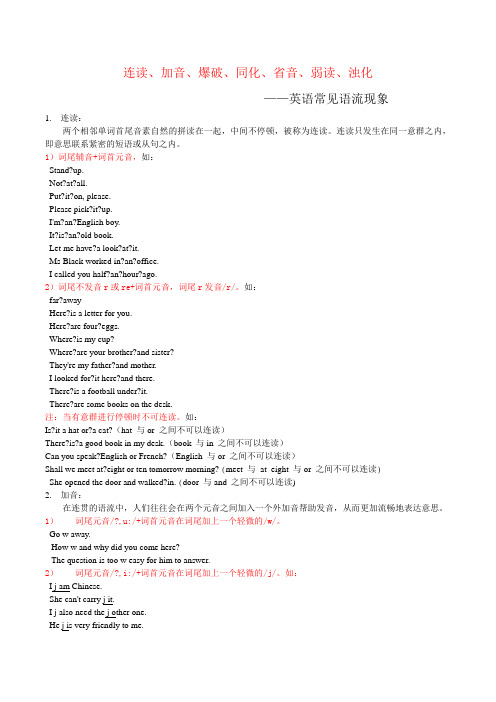
连读、加音、爆破、同化、省音、弱读、浊化——英语常见语流现象1.连读:两个相邻单词首尾音素自然的拼读在一起,中间不停顿,被称为连读。
连读只发生在同一意群之内,即意思联系紧密的短语或从句之内。
1)词尾辅音+词首元音,如:Stand?up.Not?at?all.Put?it?on, please.Please pick?it?up.I'm?an?English boy.It?is?an?old book.Let me have?a look?at?it.Ms Black worked in?an?office.I called you half?an?hour?ago.2)词尾不发音r或re+词首元音,词尾r发音/r/。
如:far?awayHere?is a letter for you.Here?are four?eggs.Where?is my cup?Where?are your brother?and sister?They're my father?and mother.I looked for?it here?and there.There?is a football under?it.There?are some books on the desk.注:当有意群进行停顿时不可连读。
如:Is?it a hat or?a cat?(hat 与or 之间不可以连读)There?is?a good book in my desk.(book 与in 之间不可以连读)Can you speak?English or French?(English 与or 之间不可以连读)Shall we meet at?eight or ten tomorrow morning? (meet 与at eight 与or 之间不可以连读)She opened the door and walked?in. (door 与and 之间不可以连读)2.加音:在连贯的语流中,人们往往会在两个元音之间加入一个外加音帮助发音,从而更加流畅地表达意思。
英语中读音中强读弱读连读失爆等规则
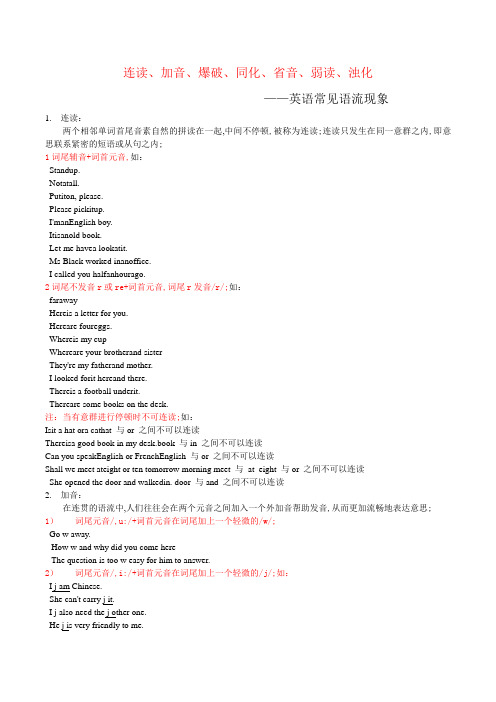
连读、加音、爆破、同化、省音、弱读、浊化——英语常见语流现象1.连读:两个相邻单词首尾音素自然的拼读在一起,中间不停顿,被称为连读;连读只发生在同一意群之内,即意思联系紧密的短语或从句之内;1词尾辅音+词首元音,如:Standup.Notatall.Putiton, please.Please pickitup.I'manEnglish boy.Itisanold book.Let me havea lookatit.Ms Black worked inanoffice.I called you halfanhourago.2词尾不发音r或re+词首元音,词尾r发音/r/;如:farawayHereis a letter for you.Hereare foureggs.Whereis my cupWhereare your brotherand sisterThey're my fatherand mother.I looked forit hereand there.Thereis a football underit.Thereare some books on the desk.注:当有意群进行停顿时不可连读;如:Isit a hat ora cathat 与or 之间不可以连读Thereisa good book in my desk.book 与in 之间不可以连读Can you speakEnglish or FrenchEnglish 与or 之间不可以连读Shall we meet ateight or ten tomorrow morning meet 与at eight 与or 之间不可以连读She opened the door and walkedin. door 与and 之间不可以连读2.加音:在连贯的语流中,人们往往会在两个元音之间加入一个外加音帮助发音,从而更加流畅地表达意思; 1)词尾元音/,u:/+词首元音在词尾加上一个轻微的/w/;Go w away.How w and why did you come hereThe question is too w easy for him to answer.2)词尾元音/,i:/+词首元音在词尾加上一个轻微的/j/;如:I j am Chinese.She can't carry j it.I j also need the j other one.He j is very friendly to me.She wants to study j English.It'll take you three j hours to walk there.3. 失去爆破与不完全爆破:1失去爆破:爆破音+爆破音当两个爆破音/p,b,t,d,k,g/相邻时,前一个爆破音只按其发音部位做好发音口形、形成阻碍而不爆破出来,稍微停顿后即发出后面的辅音;前一个爆破音被称为失去爆破;失去爆破产生的原因大体上是由于省力原则造成的;如:Kept/Blackboard/Notebook/Goodbye/September/Suitcase/Big boy/Sharp pencilWhat timeYou must pay.Ask Bob to sit behind me.She took good care of the children.2不完全爆破:A爆破音+摩擦音:爆破音/p,b,t,d,k,g/与摩擦音/f,v,s,z,,,θ,e,r,h/相邻时产生不完全爆破;发摩擦音时发音器官并不形成阻碍而只形成一个很狭小的缝隙让气流从缝隙中摩擦而出;如果一个爆破音与摩擦音相接它爆破冲出的气流只能从狭小的缝隙中通过这种爆破是不完全的;失去爆破产生的原因大体上是由于省力原则造成的;如:Advance/SuccessA good viewOld friendsJust thenGet throughMake sureNight showKeep silenceKeep that in mindB爆破音+破擦音:爆破音与破擦音/t,d,tr,dr/相邻时产生不完全爆破;如Picture/ObjectThat childGood jobSweet dreamGreat changesA fast trainC爆破音+鼻辅音:爆破音与鼻辅音/m,n,/相邻时:在词中,不完全爆破;在词尾鼻腔爆破;如:Utmost/Admit/Midnight/Certain/Button/GardenGood morningGood nightStart nowI don’t knowJust momentA good neighborD爆破音+边辅音:爆破音与边辅音/l/相邻时:在词中,不完全爆破;在词尾舌侧爆破;如:Lately/Badly/Mostly/Friendly A bit louderI’d like toStraight lineGood luckAt lastAt lunch4.同化:人们在说话的时往往会不自觉地让一个音受相邻音的影响,使它们变得与其相同或相似;或者两个音互相影响变为第三个音;这两种现象被称为音的同化;同化可以发生在同一个词、复合词内或者句子相邻词之间;1因声带的影响而发生的同化:A浊辅音可变为清辅音,如:ofv→f course hisz→s pen withe→θpleasure;B清辅音可变为浊辅音,如:likek→g that;2因发音部位的影响而发生的同化:A/t/+/j/→/t/;如:Don’t hu rt yourselfI’ll le t you go this time.Don’t you do that again.It’s very nice to mee t you.B/d/+/j/→/d/;如:Did your sister comeWould you please come inCould you read this for me pleaseYou didn’t like English, did youC/s/+/j/→//;如:I miss you.May God bless you.We will come this year.D/z/+/j/→//;如:Here’s your ticket.I love you because you are you.Don’t expect he tell s you the truth5. 省音:在快速、随便的言语中一些音素被省略掉被称为省音;省音能提高语速,使说话省力;在正式场合和语速慢的情况下,省音不是必须的;1同一单词内元音的省略,主要是非重读音节中的//和//,如:ordinary;2当前一单词以辅音结尾,后一单词以//开头时,//常被省略,如:walk away;3当前一单词以否定形式-n't结尾,后一单词以辅音开头时,/t/常被忽略,如:She isn’t there.I didn’t hear you.He can’t believe that.4)任何一个辅音若后面紧跟着/h/,/h/可以不发音;如:Come hereMust he /ti/ goWhat will he /wili/doHas he done it beforeTell him to ask her…5)将多个单词利用连读爆破等拼和在一起;如:gottagot togonnagoing tokindakind oflotsalots ofgimmegive me6. 强读式和弱读式:在一个句子,有些词说得又轻又快,而且较为含糊,有些词则说得又重又慢,而且较为清晰;那些说得响亮而清晰的词就是句子重音所在;实词包括名词、实义动词、形容词、副词、数词疑问词等一般都接受句子重音,为重读词,采用强读式:虚词包括介词、代词、连词、冠词、助动词、情态动词等功能词一般都不接受句子重音,为非重读词,采用弱读式;一般规律:1弱读式只出现在句子的非重读词中;如:Pass me/m/ the/e/ book. me、the弱读;2单词单独出现或在句首或句尾时,都采用强读式;如:What are you listening to/tu:/3被特别强调的词无论实词还是虚词都采用强读式;如:I am/m/ Peter. 我就是皮特;虚词弱读规律:1长音变短音,如:she/i:/弱读//;2元音前面的辅音被省略,如:him/hm/弱读/m/;3辅音前面的元音被省略,如:am/m/弱读/m/;4元音一般弱读为//,如:can/kn/弱读/kn/;5部分虚词有多种弱读式,如:would/wd/弱读/d,d/;7. 浊化:1/s/ 后面的清辅音要浊化;如:/k/浊化成/g/: scar/school/discussion/t/浊化成/d/: stand/student/mistake/p/浊化成/b/: spring/spirit/expression2美音中,当/t/出现在两个元音之间并且处于非重读位置的时候,/t/需要浊化成一个近似于/d/的音;这样,writer听起来和rider 的发音几乎没有区别;如:Letter/water/better/duty/bitter/cityI got it.Would you please pick it up注:/t/如果处于重读位置的话,即使在两个元音之间也不需要浊化;请比较:清晰的/t/ 浊化的/t/I'talian 'Italya'tomic 'atomLa'tino 'Latinpho'tographer 'photograph3美音中,当/t/前面是一个元音,后面是一个模糊的/l/,且处于非重读位置,/t/也需要浊化成一个近似于/d/的音;如:Battle/bottle/cattle/little/rattle/settle4美音中,当/t/前面是一个清辅音或前鼻音/n/,后面是一个元音,且处于非重读位置,/t/也需要浊化成一个近似于/d/的音;如:Twenty/fifty/center/after/faster/actor/sister/yesterday朗读练习:1. There are many things to consider when you are looking for a house, whether you intend to buy or only rent.After all, it is going to be your home, perhaps for quite a long time, and you want to be happy with it. You have to decide exactly what kind of house you want, how much you can afford to pay, and the type of neighborhood you wish to live in. Howeve r, it’s always easy to forget all above, because it’s most probably that you’ll fall in love with the house for sale at the first sight.2. YouthYouth is not a time of life; it is a state of mind; it is not a matter of rosy cheeks, red lips and supple knees; it is a matter of the will, a quality of the imagination, a vigor of the emotions; it is the freshness of the deep springs of life.Youth means a temperamental predominance of courage over timidity, of the appetite for adventure over the love of ease. This often exists in a man of sixty more than a boy of twenty. Nobody grows old merely by a number of years. We grow old by deserting our ideals.Years may wrinkle the skin, but to give up enthusiasm wrinkles the soul. Worry, fear, self-distrust bows the heart and turns the spirit back to dust.Whether sixty or sixteen, there is in every human being's heart the lure of wonder, the unfailing childlike appetite for what's next, and the joy of the game of living. In the center of your heart and my heart there is a wireless station; so long as it receives messages of beauty, hope, cheer, courage and power from men and from the Infinite, so long are you young.When the aerials are down, and your spirit is covered with snows of cynicism and the ice of pessimism, then you are grown old, even at twenty; but as long as your aerials are up, to catch the waves of optimism, there is hope you may die young at eighty.。
2021年英语中读音中强读、弱读、连读、失爆等规则
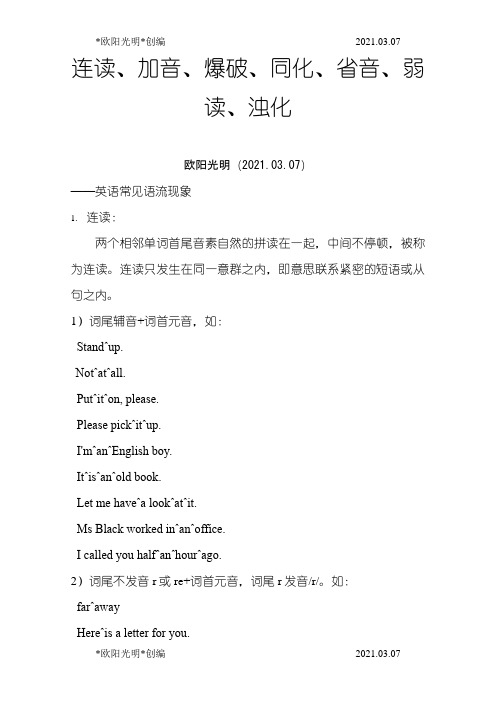
连读、加音、爆破、同化、省音、弱读、浊化欧阳光明(2021.03.07)——英语常见语流现象1.连读:两个相邻单词首尾音素自然的拼读在一起,中间不停顿,被称为连读。
连读只发生在同一意群之内,即意思联系紧密的短语或从句之内。
1)词尾辅音+词首元音,如:Standˆup.Notˆatˆall.Putˆitˆon, please.Please pickˆitˆup.I'mˆanˆEnglish boy.Itˆisˆanˆold book.Let me haveˆa lookˆatˆit.Ms Black worked inˆanˆoffice.I called you halfˆanˆhourˆago.2)词尾不发音r或re+词首元音,词尾r发音/r/。
如:farˆawayHereˆis a letter for you.Hereˆare fourˆeggs.Whereˆis my cup?Whereˆare your brotherˆand sister?They're my fatherˆand mother.I looked forˆit hereˆand there.Thereˆis a football underˆit.Thereˆare some books on the desk.注:当有意群进行停顿时不可连读。
如:Isˆit a hat orˆa cat?(hat 与or 之间不可以连读)Thereˆisˆa good book in my desk.(book 与in 之间不可以连读)Can you speakˆEnglish or French?(English 与or 之间不可以连读)Shall we me et atˆeight or ten tomorrow morning? (meet 与ateight 与or 之间不可以连读)She opened the door and walkedˆin. (door 与and 之间不可以连读) 2.加音:在连贯的语流中,人们往往会在两个元音之间加入一个外加音帮助发音,从而更加流畅地表达意思。
英语中读音中强读 弱读 连读 失爆等规则
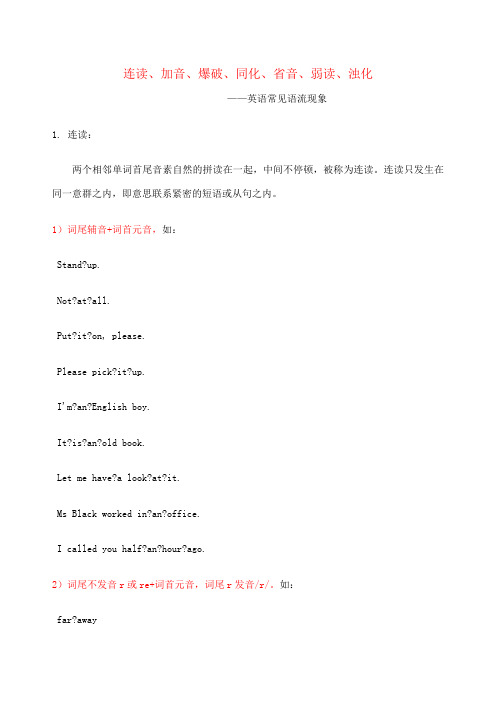
连读、加音、爆破、同化、省音、弱读、浊化——英语常见语流现象1.连读:两个相邻单词首尾音素自然的拼读在一起,中间不停顿,被称为连读。
连读只发生在同一意群之内,即意思联系紧密的短语或从句之内。
1)词尾辅音+词首元音,如:Stand?up.Not?at?all.Put?it?on, please.Please pick?it?up.I'm?an?English boy.It?is?an?old book.Let me have?a look?at?it.Ms Black worked in?an?office.I called you half?an?hour?ago.2)词尾不发音r或re+词首元音,词尾r发音/r/。
如:far?awayHere?is a letter for you.Here?are four?eggs.Where?is my cup?Where?are your brother?and sister?They're my father?and mother.I looked for?it here?and there.There?is a football under?it.There?are some books on the desk.注:当有意群进行停顿时不可连读。
如:Is?it a hat or?a cat?(hat 与or 之间不可以连读)There?is?a good book in my desk.(book 与in 之间不可以连读)Can you speak?English or French?(English 与or 之间不可以连读)Shall we meet at?eight or ten tomorrow morning? (meet 与 at eight 与or 之间不可以连读)She opened the door and walked?in. (door 与and 之间不可以连读)2.加音:在连贯的语流中,人们往往会在两个元音之间加入一个外加音帮助发音,从而更加流畅地表达意思。
英语中读音中强读弱读连读失爆等规则
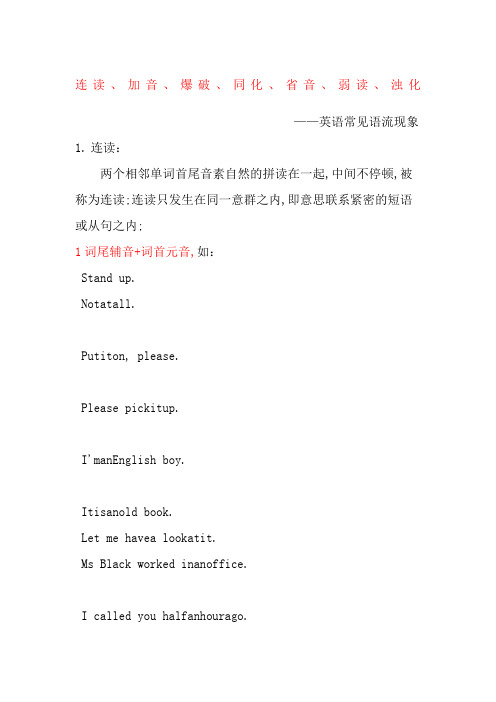
连读、加音、爆破、同化、省音、弱读、浊化——英语常见语流现象1.连读:两个相邻单词首尾音素自然的拼读在一起,中间不停顿,被称为连读;连读只发生在同一意群之内,即意思联系紧密的短语或从句之内;1词尾辅音+词首元音,如:Stand up.Notatall.Putiton, please.Please pickitup.I'manEnglish boy.Itisanold book.Let me havea lookatit.Ms Black worked inanoffice.I called you halfanhourago.2词尾不发音r或re+词首元音,词尾r发音/r/;如:far awayHere is a letter for you.Hereare foureggs.Whereis my cupWhereare your brotherand sisterThey're my father and mother.I looked forit hereand there.Thereis a football underit.There are some books on the desk.注:当有意群进行停顿时不可连读;如:Isit a hat ora cathat 与or 之间不可以连读Thereisa good book in my desk.book 与in 之间不可以连读Can you speakEnglish or FrenchEnglish 与or 之间不可以连读Shall we meet ateight or ten tomorrow morning meet 与 at eight 与or 之间不可以连读She opened the door and walked in. door 与and 之间不可以连读2.加音:在连贯的语流中,人们往往会在两个元音之间加入一个外加音帮助发音,从而更加流畅地表达意思;1)词尾元音/2),u:/+词首元音在词尾加上一个轻微的/w/;Go w away.How w and why did you come hereThe question is too w easy for him to answer.3)词尾元音/4),i:/+词首元音在词尾加上一个轻微的/j/;如:I j am Chinese.She can't carry j it.I j also need the j other one.He j is very friendly to me.She wants to study j English.It'll take you three j hours to walk there.3. 失去爆破与不完全爆破:1失去爆破:爆破音+爆破音当两个爆破音/p,b,t,d,k,g/相邻时,前一个爆破音只按其发音部位做好发音口形、形成阻碍而不爆破出来,稍微停顿后即发出后面的辅音;前一个爆破音被称为失去爆破;失去爆破产生的原因大体上是由于省力原则造成的;如:Kept/Blackboard/Notebook/Goodbye/September/Suitcase/Big boy/Sharp pencilWhat timeYou must pay.Ask Bob to sit behind me.She took good care of the children.2不完全爆破:A爆破音+摩擦音:爆破音/p,b,t,d,k,g/与摩擦音/f,v,s,z,,,θ,e,r,h/相邻时产生不完全爆破;发摩擦音时发音器官并不形成阻碍而只形成一个很狭小的缝隙让气流从缝隙中摩擦而出;如果一个爆破音与摩擦音相接它爆破冲出的气流只能从狭小的缝隙中通过这种爆破是不完全的;失去爆破产生的原因大体上是由于省力原则造成的;如: Advance/SuccessA good viewOld friendsJust thenGet throughMake sureNight showKeep silenceKeep that in mindB爆破音+破擦音:爆破音与破擦音/t,d,tr,dr/相邻时产生不完全爆破;如Picture/ObjectThat childGood jobSweet dreamGreat changesA fast trainC爆破音+鼻辅音:爆破音与鼻辅音/m,n,/相邻时:在词中,不完全爆破;在词尾鼻腔爆破;如:Utmost/Admit/Midnight/Certain/Button/GardenGood morningGood nightStart nowI don’t knowJust momentA good neighborD爆破音+边辅音:爆破音与边辅音/l/相邻时:在词中,不完全爆破;在词尾舌侧爆破;如:Lately/Badly/Mostly/FriendlyA bit louderI’d like toStraight lineGood luckAt lastAt lunch4.同化:人们在说话的时往往会不自觉地让一个音受相邻音的影响,使它们变得与其相同或相似;或者两个音互相影响变为第三个音;这两种现象被称为音的同化;同化可以发生在同一个词、复合词内或者句子相邻词之间;1因声带的影响而发生的同化:A浊辅音可变为清辅音,如:ofv→f course hisz→s pen withe →θ pleasure;B清辅音可变为浊辅音,如:likek→g that;2因发音部位的影响而发生的同化:A/t/+/j/→/t/;如:Don’t hu rt yourselfI’ll le t you go this time.Don’t you do that again.It’s very nice to mee t you.B/d/+/j/→/d/;如:Did your sister comeWould you please come inCould you read this for me please You didn’t like English, did youC/s/+/j/→//;如:I miss you.May God bless you.We will come this year.D/z/+/j/→//;如:Here’s your ticket.I love you because you are you.Don’t expect he tell s you the truth5. 省音:在快速、随便的言语中一些音素被省略掉被称为省音;省音能提高语速,使说话省力;在正式场合和语速慢的情况下,省音不是必须的;1同一单词内元音的省略,主要是非重读音节中的//和//,如:ordinary;2当前一单词以辅音结尾,后一单词以//开头时,//常被省略,如:walk away;3当前一单词以否定形式-n't结尾,后一单词以辅音开头时,/t/常被忽略,如:She isn’t there.I didn’t hear you.He can’t believe that.4)任何一个辅音若后面紧跟着/h/,/h/可以不发音;如:Come hereMust he /ti/ goWhat will he /wili/doHas he done it beforeTell him to ask her…5)将多个单词利用连读爆破等拼和在一起;如:gottagot togonnagoing tokindakind oflotsalots ofgimmegive me6. 强读式和弱读式:在一个句子,有些词说得又轻又快,而且较为含糊,有些词则说得又重又慢,而且较为清晰;那些说得响亮而清晰的词就是句子重音所在;实词包括名词、实义动词、形容词、副词、数词疑问词等一般都接受句子重音,为重读词,采用强读式:虚词包括介词、代词、连词、冠词、助动词、情态动词等功能词一般都不接受句子重音,为非重读词,采用弱读式;6.1 一般规律:1弱读式只出现在句子的非重读词中;如:Pass me/m/ the/e/ book. me、the弱读;2单词单独出现或在句首或句尾时,都采用强读式;如:What are you listening to/tu:/3被特别强调的词无论实词还是虚词都采用强读式;如:I am/ m/ Peter. 我就是皮特;6.2 虚词弱读规律:1长音变短音,如:she/i:/弱读//;2元音前面的辅音被省略,如:him/h m/弱读/m/;3辅音前面的元音被省略,如:am/m/弱读/m/;4元音一般弱读为//,如:can/k n/弱读/k n/;5部分虚词有多种弱读式,如:would/w d/弱读/d,d/;7. 浊化:1/s/ 后面的清辅音要浊化;如:/k/浊化成/g/: scar/school/discussion/t/浊化成/d/: stand/student/mistake/p/浊化成/b/: spring/spirit/expression2美音中,当/t/出现在两个元音之间并且处于非重读位置的时候,/t/需要浊化成一个近似于/d/的音;这样,writer听起来和rider 的发音几乎没有区别;如:Letter/water/better/duty/bitter/cityI got it.Would you please pick it up注:/t/如果处于重读位置的话,即使在两个元音之间也不需要浊化;请比较:清晰的/t/ 浊化的/t/I'talian 'Italya'tomic 'atomLa'tino 'Latinpho'tographer 'photograph3美音中,当/t/前面是一个元音,后面是一个模糊的/l/,且处于非重读位置,/t/也需要浊化成一个近似于/d/的音;如:Battle/bottle/cattle/little/rattle/settle4美音中,当/t/前面是一个清辅音或前鼻音/n/,后面是一个元音,且处于非重读位置,/t/也需要浊化成一个近似于/d/的音;如:Twenty/fifty/center/after/faster/actor/sister/yesterday 朗读练习:1. There are many things to consider when you are looking for a house, whether you intend to buy or only rent. After all, it is going to be your home, perhaps for quite a long time, and you want to be happy with it. You have to decideexactly what kind of house you want, how much you can afford to pay, and the type of neighborhood you wish to live in. However, it’s always easy to forget all above, because it’s most probably that you’ll fall in love with the house for sale at the first sight.2. YouthYouth is not a time of life; it is a state of mind; it is not a matter of rosy cheeks, red lips and supple knees; it is a matter of the will, a quality of the imagination, a vigor of the emotions; it is the freshness of the deep springs of life.Youth means a temperamental predominance of courage over timidity, of the appetite for adventure over the love of ease. This often exists in a man of sixty more than a boy of twenty. Nobody grows old merely by a number of years. We grow old by deserting our ideals.Years may wrinkle the skin, but to give up enthusiasm wrinkles the soul. Worry, fear, self-distrust bows the heart and turns the spirit back to dust.Whether sixty or sixteen, there is in every human being's heart the lure of wonder, the unfailing childlike appetite for what's next, and the joy of the game of living.In the center of your heart and my heart there is a wireless station; so long as it receives messages of beauty, hope, cheer, courage and power from men and from the Infinite, so long are you young.When the aerials are down, and your spirit is covered with snows of cynicism and the ice of pessimism, then you are grown old, even at twenty; but as long as your aerials are up, to catch the waves of optimism, there is hope you may die young at eighty.。
英语中读音中强读弱读连读失爆等规则
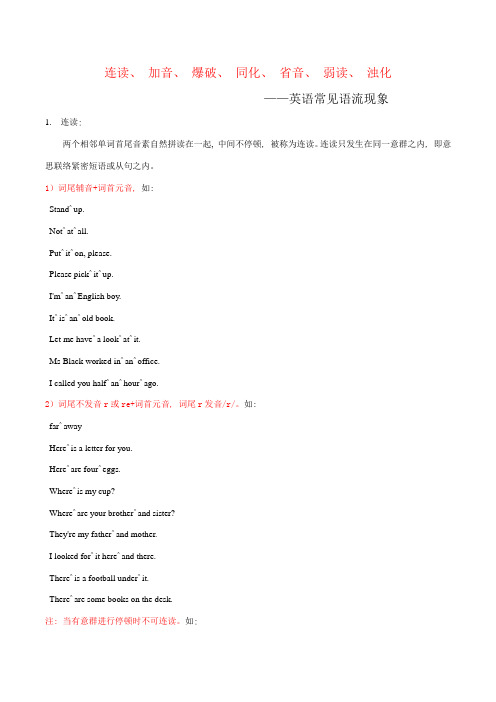
连读、加音、爆破、同化、省音、弱读、浊化——英语常见语流现象1.连读:两个相邻单词首尾音素自然拼读在一起, 中间不停顿, 被称为连读。
连读只发生在同一意群之内, 即意思联络紧密短语或从句之内。
1)词尾辅音+词首元音, 如:Standˆup.Notˆatˆall.Putˆitˆon, please.Please pickˆitˆup.I'mˆanˆEnglish boy.Itˆisˆanˆold book.Let me haveˆa lookˆatˆit.Ms Black worked inˆanˆoffice.I called you halfˆanˆhourˆago.2)词尾不发音r或re+词首元音, 词尾r发音/r/。
如:farˆawayHereˆis a letter for you.Hereˆare fourˆeggs.Whereˆis my cup?Whereˆare your brotherˆand sister?They're my fatherˆand mother.I looked forˆit hereˆand there.Thereˆis a football underˆit.Thereˆare some books on the desk.注: 当有意群进行停顿时不可连读。
如:Isˆit a hat orˆa cat? (hat 与or 之间不能够连读)Thereˆisˆa good book in my desk.(book 与in 之间不能够连读)Can you speakˆEnglish or Fren ch? (English 与or 之间不能够连读)Shall we meet atˆeight or ten tomorrow morning? (meet 与at eight 与or 之间不能够连读)She opened the door and walkedˆin. (door 与and 之间不能够连读)2.加音:在连贯语流中, 大家往往会在两个元音之间加入一个外加音帮助发音, 从而愈加流畅地表示意思。
英语中读音中强读弱读连读失爆等规则
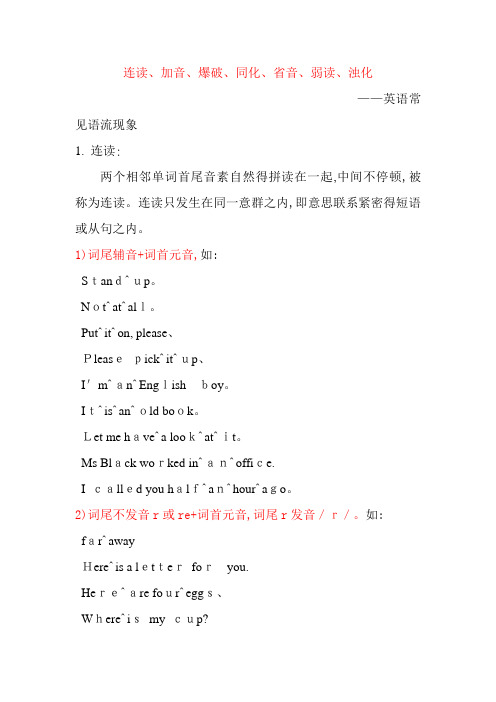
连读、加音、爆破、同化、省音、弱读、浊化——英语常见语流现象1.连读:两个相邻单词首尾音素自然得拼读在一起,中间不停顿,被称为连读。
连读只发生在同一意群之内,即意思联系紧密得短语或从句之内。
1)词尾辅音+词首元音,如:Standˆup。
Notˆatˆall。
Putˆitˆon, please、Pleasepickˆitˆup、I'mˆanˆEnglishboy。
Itˆisˆanˆold book。
Let me haveˆa lookˆatˆit。
Ms Black worked inˆanˆoffice.I called you halfˆanˆhourˆago。
2)词尾不发音r或re+词首元音,词尾r发音/r/。
如:farˆawayHereˆis a letterforyou.Hereˆare fourˆeggs、Whereˆismy cup?Whereˆare yourbrotherˆandsister?They're my fatherˆand mother。
I lookedforˆit hereˆand there.Thereˆis a football underˆit.Thereˆare some books on the desk.注:当有意群进行停顿时不可连读。
如:Isˆit a hat orˆa cat?(hat 与or 之间不可以连读)Thereˆisˆa goodbook in my desk、(book与in之间不可以连读)Can youspeakˆEnglish or French?(English与or 之间不可以连读)Shallwe meet atˆeight ortentomorrow morni ng?(meet 与at eight 与or之间不可以连读)She opened thedoor and walkedˆin. (door与and 之间不可以连读)2.加音:在连贯得语流中,人们往往会在两个元音之间加入一个外加音帮助发音,从而更加流畅地表达意思。
英语中读音中强读、弱读、连读、失爆等规则

连读、加音、爆破、同化、省音、弱读、浊化——英语常见语流现象1.连读:两个相邻单词首尾音素自然的拼读在一起,中间不停顿,被称为连读。
连读只发生在同一意群之内,即意思联系紧密的短语或从句之内。
1)词尾辅音+词首元音,如:Standˆup.Notˆatˆall.Putˆitˆon, please.Please pickˆitˆup.I'mˆanˆEnglish boy.Itˆisˆanˆold book.Let me haveˆa lookˆatˆit.Ms Black worked inˆanˆoffice.I called you halfˆanˆhourˆago.2)词尾不发音r或re+词首元音,词尾r发音/r/。
如:farˆawayHereˆis a letter for you.Hereˆare fourˆeggs.Whereˆis my cup?Whereˆare your brotherˆand sister?They're my fatherˆand mother.I looked forˆit hereˆand there.Thereˆis a football underˆit.Thereˆare some books on the desk.注:当有意群进行停顿时不可连读。
如:Isˆit a hat orˆa cat?(hat 与or 之间不可以连读)Thereˆisˆa good book in my desk.(book 与in 之间不可以连读)Can you speakˆEnglish or French?(English 与or 之间不可以连读)Shall we meet atˆeight or ten tomorrow morning? (meet 与at eight 与or 之间不可以连读)She opened the door and walkedˆin. (door 与and 之间不可以连读)2.加音:在连贯的语流中,人们往往会在两个元音之间加入一个外加音帮助发音,从而更加流畅地表达意思。
英语中读音中强读弱读连读失爆等规则

连读、加音、爆破、同化、省音、弱读、浊化——英语常见语流现象1.连读:两个相邻单词首尾音素自然的拼读在一起;中间不停顿;被称为连读..连读只发生在同一意群之内;即意思联系紧密的短语或从句之内..1词尾辅音+词首元音;如:Stand up.Not at all.Put it on; please.Please pick it up.I'm an English boy.It is an old book.Let me have a look at it.Ms Black worked in an office.I called you half an hour ago.2词尾不发音r或re+词首元音;词尾r发音/r/..如:far awayHere is a letter for you.Here are four eggs.Where is my cupWhere are your brother and sisterThey're my father and mother.I looked for it here and there.There is a football under it.There are some books on the desk.注:当有意群进行停顿时不可连读..如:Is it a hat or a cat hat 与or 之间不可以连读There is a good book in my desk.book 与in 之间不可以连读Can you speak English or French English 与or 之间不可以连读Shall we meet at eight or ten tomorrow morning meet 与 at eight 与or 之间不可以连读She opened the door and walked in. door 与and 之间不可以连读2.加音:在连贯的语流中;人们往往会在两个元音之间加入一个外加音帮助发音;从而更加流畅地表达意思..1)词尾元音/ ;u:/+词首元音在词尾加上一个轻微的/w/..Go w away.How w and why did you come hereThe question is too w easy for him to answer.2)词尾元音/ ;i:/+词首元音在词尾加上一个轻微的/j/..如:I j am Chinese.She can't carry j it.I j also need the j other one.He j is very friendly to me.She wants to study j English.It'll take you three j hours to walk there.3. 失去爆破与不完全爆破:1失去爆破:爆破音+爆破音当两个爆破音/p;b;t;d;k;g/相邻时;前一个爆破音只按其发音部位做好发音口形、形成阻碍而不爆破出来;稍微停顿后即发出后面的辅音..前一个爆破音被称为失去爆破..失去爆破产生的原因大体上是由于省力原则造成的..如:Kept/Blackboard/Notebook/Goodbye/September/Suitcase/Big boy/Sharp pencil What timeYou must pay.Ask Bob to sit behind me.She took good care of the children.2不完全爆破:A爆破音+摩擦音:爆破音/p;b;t;d;k;g/与摩擦音/f;v;s;z; ; ;θ;e;r;h/相邻时产生不完全爆破..发摩擦音时发音器官并不形成阻碍而只形成一个很狭小的缝隙让气流从缝隙中摩擦而出..如果一个爆破音与摩擦音相接它爆破冲出的气流只能从狭小的缝隙中通过这种爆破是不完全的..失去爆破产生的原因大体上是由于省力原则造成的..如:Advance/SuccessA good viewOld friendsJust thenGet throughMake sureNight showKeep silenceKeep that in mindB爆破音+破擦音:爆破音与破擦音/t ;d ;tr;dr/相邻时产生不完全爆破..如Picture/Object That childGood jobSweet dreamGreat changesA fast trainC爆破音+鼻辅音:爆破音与鼻辅音/m;n; /相邻时:在词中;不完全爆破;在词尾鼻腔爆破..如:Utmost/Admit/Midnight/Certain/Button/GardenGood morningGood nightStart nowI don’t knowJust momentA good neighborD爆破音+边辅音:爆破音与边辅音/l/相邻时:在词中;不完全爆破;在词尾舌侧爆破..如:Lately/Badly/Mostly/FriendlyA bit louderI’d like toStraight lineGood luckAt lastAt lunch4.同化:人们在说话的时往往会不自觉地让一个音受相邻音的影响;使它们变得与其相同或相似;或者两个音互相影响变为第三个音..这两种现象被称为音的同化..同化可以发生在同一个词、复合词内或者句子相邻词之间..1因声带的影响而发生的同化:A浊辅音可变为清辅音;如:ofv→f course hisz→s pen withe→θ pleasure..B清辅音可变为浊辅音;如:likek→g that..2因发音部位的影响而发生的同化:A/t/+/j/→/t /..如:Don’t hu rt yourselfI’ll le t you go this time.Don’t you do that again.It’s very nice to mee t you.B/d/+/j/→/d /..如:Did your sister comeWould you please come inCould you read this for me pleaseYou didn’t like English; di d youC/s/+/j/→/ /..如:I miss you.May God bless you.We will come this year.D/z/+/j/→/ /..如:Here’s your ticket.I love you because you are you.Don’t expect he tell s you the truth5. 省音:在快速、随便的言语中一些音素被省略掉被称为省音..省音能提高语速;使说话省力..在正式场合和语速慢的情况下;省音不是必须的..1同一单词内元音的省略;主要是非重读音节中的/ /和/ /;如:ordinary..2当前一单词以辅音结尾;后一单词以/ /开头时;/ /常被省略;如:walk away..3当前一单词以否定形式-n't结尾;后一单词以辅音开头时;/t/常被忽略;如:She isn’t there.I didn’t hear you.He can’t believe that.4)任何一个辅音若后面紧跟着/h/;/h/可以不发音..如:Come hereMust he /ti/ goWhat will he /wili/doHas he done it beforeTell him to ask her…5)将多个单词利用连读爆破等拼和在一起..如:gottagot togonnagoing tokindakind oflotsalots ofgimmegive me6. 强读式和弱读式:在一个句子;有些词说得又轻又快;而且较为含糊;有些词则说得又重又慢;而且较为清晰..那些说得响亮而清晰的词就是句子重音所在..实词包括名词、实义动词、形容词、副词、数词疑问词等一般都接受句子重音;为重读词;采用强读式:虚词包括介词、代词、连词、冠词、助动词、情态动词等功能词一般都不接受句子重音;为非重读词;采用弱读式..6.1 一般规律:1弱读式只出现在句子的非重读词中..如:Pass me/m / the/e / book. me、the弱读.. 2单词单独出现或在句首或句尾时;都采用强读式..如:What are you listening to/tu:/3被特别强调的词无论实词还是虚词都采用强读式..如:I am/ m/ Peter. 我就是皮特..6.2 虚词弱读规律:1长音变短音;如:she/ i:/弱读/ /..2元音前面的辅音被省略;如:him/h m/弱读/ m/..3辅音前面的元音被省略;如:am/ m/弱读/m/..4元音一般弱读为/ /;如:can/k n/弱读/k n/..5部分虚词有多种弱读式;如:would/w d/弱读/ d;d/..7. 浊化:1/s/ 后面的清辅音要浊化..如:/k/浊化成/g/: scar/school/discussion/t/浊化成/d/: stand/student/mistake/p/浊化成/b/: spring/spirit/expression2美音中;当/t/出现在两个元音之间并且处于非重读位置的时候;/t/需要浊化成一个近似于/d/的音..这样;writer听起来和rider 的发音几乎没有区别..如:Letter/water/better/duty/bitter/cityI got it.Would you please pick it up注:/t/如果处于重读位置的话;即使在两个元音之间也不需要浊化..请比较:清晰的/t/ 浊化的/t/I'talian 'Italya'tomic 'atomLa'tino 'Latinpho'tographer 'photograph3美音中;当/t/前面是一个元音;后面是一个模糊的/l/;且处于非重读位置;/t/也需要浊化成一个近似于/d/的音..如: Battle/bottle/cattle/little/rattle/settle4美音中;当/t/前面是一个清辅音或前鼻音/n/;后面是一个元音;且处于非重读位置;/t/也需要浊化成一个近似于/d/的音..如:Twenty/fifty/center/after/faster/actor/sister/yesterday朗读练习:1. There are many things to consider when you are looking for a house; whether you intend to buy or only rent. After all; it is going to be your home; perhaps for quite a long time; and you want to be happy with it. You have to decide exactly what kind of house you want; how much you can afford to pay; and the type of neighborhood you wish to live in. However; it’s always easy to forget all above; because it’s most probably that you’ll fall in love with the house for sale at the first sight.2. YouthYouth is not a time of life; it is a state of mind; it is not a matter of rosy cheeks; red lips and supple knees; it is a matter of the will; a quality of the imagination; a vigor of the emotions; it is the freshness of the deep springs of life.Youth means a temperamental predominance of courage over timidity; of the appetite for adventure over the love of ease. This often exists in a man of sixty more than a boy of twenty. Nobody grows old merely by a number of years.We grow old by deserting our ideals.Years may wrinkle the skin; but to give up enthusiasm wrinkles the soul. Worry; fear; self-distrust bows the heart and turns the spirit back to dust.Whether sixty or sixteen; there is in every human being's heart the lure of wonder; the unfailing childlike appetite for what's next; and the joy of the game of living. In the center of your heart and my heart there is a wireless station; so long as it receives messages of beauty; hope; cheer; courage and power from men and from the Infinite; so long are you young.When the aerials are down; and your spirit is covered with snows of cynicism and the ice of pessimism; then you are grown old; even at twenty; but as long as your aerials are up; to catch the waves of optimism; there is hope you may die young at eighty.。
英语的中读音中强读、弱读、连读、失爆等规则..
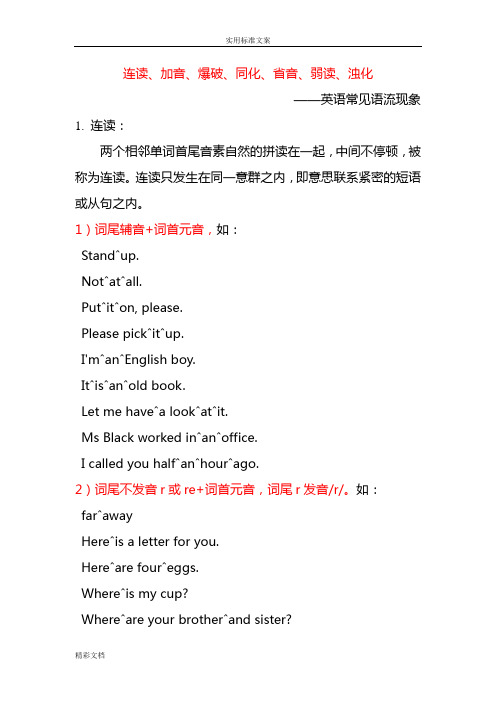
连读、加音、爆破、同化、省音、弱读、浊化——英语常见语流现象1.连读:两个相邻单词首尾音素自然的拼读在一起,中间不停顿,被称为连读。
连读只发生在同一意群之内,即意思联系紧密的短语或从句之内。
1)词尾辅音+词首元音,如:Standˆup.Notˆatˆall.Putˆitˆon, please.Please pickˆitˆup.I'mˆanˆEnglish boy.Itˆisˆanˆold book.Let me haveˆa lookˆatˆit.Ms Black worked inˆanˆoffice.I called you halfˆanˆhourˆago.2)词尾不发音r或re+词首元音,词尾r发音/r/。
如:farˆawayHereˆis a letter for you.Hereˆare fourˆeggs.Whereˆis my cup?Whereˆare your brotherˆand sister?They're my fatherˆand mother.I looked forˆit hereˆand there.Thereˆis a football underˆit.Thereˆare some books on the desk.注:当有意群进行停顿时不可连读。
如:Isˆit a hat orˆa cat?(hat 与or 之间不可以连读)Thereˆisˆa good book in my desk.(book 与in 之间不可以连读)Can you speakˆEnglish or French?(English 与or 之间不可以连读)Shall we meet atˆeight or ten tomorrow morning? (meet 与at eight 与or 之间不可以连读)She opened the door and walkedˆin. (door 与and 之间不可以连读)2.加音:在连贯的语流中,人们往往会在两个元音之间加入一个外加音帮助发音,从而更加流畅地表达意思。
- 1、下载文档前请自行甄别文档内容的完整性,平台不提供额外的编辑、内容补充、找答案等附加服务。
- 2、"仅部分预览"的文档,不可在线预览部分如存在完整性等问题,可反馈申请退款(可完整预览的文档不适用该条件!)。
- 3、如文档侵犯您的权益,请联系客服反馈,我们会尽快为您处理(人工客服工作时间:9:00-18:30)。
连读、加音、爆破、同化、省音、弱读、浊化——英语常见语流现象1.连读:两个相邻单词首尾音素自然的拼读在一起,中间不停顿,被称为连读。
连读只发生在同一意群之内,即意思联系紧密的短语或从句之内。
1)词尾辅音+词首元音,如:Standˆup.Notˆatˆall.Putˆitˆon, please.Please pickˆitˆup.I'mˆanˆEnglish boy.Itˆisˆanˆold book.Let me haveˆa lookˆatˆit.Ms Black worked inˆanˆoffice.I called you halfˆanˆhourˆago.2)词尾不发音r或re+词首元音,词尾r发音/r/。
如:farˆawayHereˆis a letter for you.Hereˆare fourˆeggs.Whereˆis my cup?Whereˆare your brotherˆand sister?They're my fatherˆand mother.I looked forˆit hereˆand there.Thereˆis a football underˆit.Thereˆare some books on the desk.注:当有意群进行停顿时不可连读。
如:Isˆit a hat orˆa cat?(hat 与or 之间不可以连读)Thereˆisˆa good book in my desk.(book 与in 之间不可以连读)Can you speakˆEnglish or French?(English 与or 之间不可以连读)Shall we meet atˆeight or ten tomorrow morning? (meet 与at eight 与or 之间不可以连读)She opened the door and walkedˆin. (door 与and 之间不可以连读)2.加音:在连贯的语流中,人们往往会在两个元音之间加入一个外加音帮助发音,从而更加流畅地表达意思。
1)词尾元音/ʊ,u:/+词首元音在词尾加上一个轻微的/w/。
Go w away.How w and why did you come here?The question is too w easy for him to answer.2)词尾元音/ɪ,i:/+词首元音在词尾加上一个轻微的/j/。
如:I j am Chinese.She can't carry j it.I j also need the j other one.He j is very friendly to me.She wants to study j English.It'll take you three j hours to walk there.3. 失去爆破与不完全爆破:1)失去爆破:爆破音+爆破音当两个爆破音/p,b,t,d,k,g/相邻时,前一个爆破音只按其发音部位做好发音口形、形成阻碍而不爆破出来,稍微停顿后即发出后面的辅音。
前一个爆破音被称为失去爆破。
失去爆破产生的原因大体上是由于省力原则造成的。
如:Kept/Blackboard/Notebook/Goodbye/September/Suitcase/Bigboy/Sharp pencilWhat timeYou must pay.Ask Bob to sit behind me.She took good care of the children.2)不完全爆破:A)爆破音+摩擦音:爆破音/p,b,t,d,k,g/与摩擦音/f,v,s,z,ʃ,ʒ,θ,ð,r,h/相邻时产生不完全爆破。
发摩擦音时发音器官并不形成阻碍而只形成一个很狭小的缝隙让气流从缝隙中摩擦而出。
如果一个爆破音与摩擦音相接它爆破冲出的气流只能从狭小的缝隙中通过这种爆破是不完全的。
失去爆破产生的原因大体上是由于省力原则造成的。
如:Advance/SuccessA good viewOld friendsJust thenGet throughMake sureNight showKeep silenceKeep that in mindB)爆破音+破擦音:爆破音与破擦音/tʃ,dʒ,tr,dr/相邻时产生不完全爆破。
如Picture/ObjectThat childGood jobSweet dreamGreat changesA fast trainC)爆破音+鼻辅音:爆破音与鼻辅音/m,n,ŋ/相邻时:在词中,不完全爆破;在词尾鼻腔爆破。
如:Utmost/Admit/Midnight/Certain/Button/GardenGood morningGood nightStart nowI don’t knowJust momentA good neighborD)爆破音+边辅音:爆破音与边辅音/l/相邻时:在词中,不完全爆破;在词尾舌侧爆破。
如:Lately/Badly/Mostly/FriendlyA bit louderI’d like toStraight lineGood luckAt lastAt lunch4.同化:人们在说话的时往往会不自觉地让一个音受相邻音的影响,使它们变得与其相同或相似;或者两个音互相影响变为第三个音。
这两种现象被称为音的同化。
同化可以发生在同一个词、复合词内或者句子相邻词之间。
1)因声带的影响而发生的同化:A)浊辅音可变为清辅音,如:of(v→f) course his(z→s) pen with(ð→θ) pleasure。
B)清辅音可变为浊辅音,如:like(k→g) that。
2)因发音部位的影响而发生的同化:A)/t/+/j/→/tʃ/。
如:Don’t hu rt yourself!I’ll le t you go this time.Don’t you do that again.It’s very nice to mee t you.B)/d/+/j/→/dʒ/。
如:Did your sister come?Would you please come in?Could you read this for me please?Yo u didn’t like English, di d you?C)/s/+/j/→/ʃ/。
如:I miss you.May God bless you.We will come this year.D)/z/+/j/→/ʒ/。
如:Here’s your ticket.I love you because you are you.Don’t expect he tell s you the truth5. 省音:在快速、随便的言语中一些音素被省略掉被称为省音。
省音能提高语速,使说话省力。
在正式场合和语速慢的情况下,省音不是必须的。
1)同一单词内元音的省略,主要是非重读音节中的/ə/和/ɪ/,如:ord(i)n(a)ry。
2)当前一单词以辅音结尾,后一单词以/ə/开头时,/ə/常被省略,如:walk (a)way。
3)当前一单词以否定形式-n't结尾,后一单词以辅音开头时,/t/常被忽略,如:She isn’(t) there.I didn’(t) hear you.He can’(t) believe that.4)任何一个辅音若后面紧跟着/h/,/h/可以不发音。
如:Come (h)ere!Must (h)e /ti/ go?What will (h)e /wili/do?Has (h)e done it before?Tell (h)im to ask (h)er…5)将多个单词利用连读爆破等拼和在一起。
如:gotta(got to)gonna(going to)kinda(kind of)lotsa(lots of)gimme(give me)6. 强读式和弱读式:在一个句子,有些词说得又轻又快,而且较为含糊,有些词则说得又重又慢,而且较为清晰。
那些说得响亮而清晰的词就是句子重音所在。
实词(包括名词、实义动词、形容词、副词、数词疑问词等)一般都接受句子重音,为重读词,采用强读式:虚词(包括介词、代词、连词、冠词、助动词、情态动词等功能词)一般都不接受句子重音,为非重读词,采用弱读式。
6.1 一般规律:1)弱读式只出现在句子的非重读词中。
如:Pass me/mɪ/ the/ðə/ book. me、the弱读。
2)单词单独出现或在句首或句尾时,都采用强读式。
如:What are you listening to/tu:/?3)被特别强调的词无论实词还是虚词都采用强读式。
如:I am/æm/ Peter. 我就是皮特。
6.2 虚词弱读规律:1)长音变短音,如:she/ʃi:/弱读/ʃɪ/。
2)元音前面的辅音被省略,如:him/hɪm/弱读/ɪm/。
3)辅音前面的元音被省略,如:am/æm/弱读/m/。
4)元音一般弱读为/ə/,如:can/kæn/弱读/kən/。
5)部分虚词有多种弱读式,如:would/wʊd/弱读/əd,d/。
7. 浊化:1)/s/ 后面的清辅音要浊化。
如:/k/浊化成/g/: scar/school/discussion/t/浊化成/d/: stand/student/mistake/p/浊化成/b/: spring/spirit/expression2)美音中,当/t/出现在两个元音之间并且处于非重读位置的时候,/t/需要浊化成一个近似于/d/的音。
这样,writer听起来和rider 的发音几乎没有区别。
如:Letter/water/better/duty/bitter/cityI got it.Would you please pick it up?注:/t/如果处于重读位置的话,即使在两个元音之间也不需要浊化。
请比较:清晰的/t/ 浊化的/t/I'talian 'Italya'tomic 'atomLa'tino 'Latinpho'tographer 'photograph3)美音中,当/t/前面是一个元音,后面是一个模糊的/l/,且处于非重读位置,/t/也需要浊化成一个近似于/d/的音。
如:Battle/bottle/cattle/little/rattle/settle4)美音中,当/t/前面是一个清辅音或前鼻音/n/,后面是一个元音,且处于非重读位置,/t/也需要浊化成一个近似于/d/的音。
